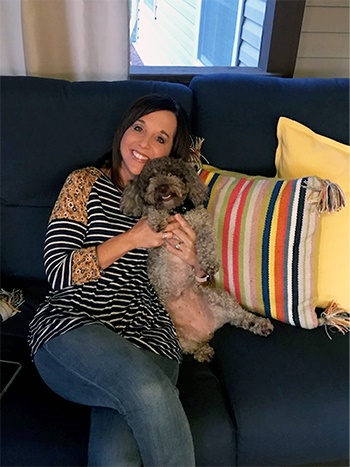HER2+ Advanced Breast Cancer Survivor
 Support, attitude, trust and faith have been the cornerstones of Heather Andrews' approach to her Stage III HER2+ inflammatory breast cancer diagnosis. Declared NED (no evidence of disease) in November 2018, she and her husband and their two boys are once again enjoying normal life. She spends her days working, running her boys to soccer and sharing valuable advice with other breast cancer survivors.
Support, attitude, trust and faith have been the cornerstones of Heather Andrews' approach to her Stage III HER2+ inflammatory breast cancer diagnosis. Declared NED (no evidence of disease) in November 2018, she and her husband and their two boys are once again enjoying normal life. She spends her days working, running her boys to soccer and sharing valuable advice with other breast cancer survivors.
Focus on the next thing
Thinking you might have cancer and knowing you do are very different feelings. For three months, I was increasingly concerned something was wrong, but the moment I knew, everything changed. On April 2, 2018, I was diagnosed with Stage IIIB HER2+ inflammatory breast cancer (IBC). The uncertainty was gone, and I needed a plan. I took a day to cry, and my brother called with this advice: “You can take a day or two, then I need you to fight.” So that’s what I did.
My best friend’s sister was my hair stylist, and she called right away. “You have to cold cap,” she said, explaining that freezing my hair follicles could limit hair loss during chemotherapy. I was in. As silly as it sounds, I felt that if I looked and felt like myself for my boys, who were 7 and 11, their lives could stay almost
normal. I contacted a cold cap company and ordered the supplies
even before my first oncology appointment.
Once I met with my doctor, I felt more comfortable. He explained I was HER2+ and BRCA negative and wrote down the details of my treatment plan. At the bottom of the page he wrote and circled the word “curable.” He said that’s what we were going for, and he told me, “We’ve got this.”
I try to stay positive and not get ahead of myself, focusing on the next thing: have a PET, get a port, keep up my iron levels so I never miss a treatment because that is curing me. On the mornings I had chemotherapy, my brother texted me something funny from our childhood to motivate me, usually a picture of Hulk Hogan or another WWF wrestler. He knows what makes me tick.
The cold capping took coordination. We nicknamed my husband “the keeper of the caps.” He was charged with getting 80 pounds of dry ice the night before chemotherapy and making sure the caps were at the right extremely cold temperature. It was hard for him to not be able to fix what I was going through, and this job gave him something he could control.
I was able to work during chemotherapy with an adjusted schedule, which helped keep a little normalcy in my life.
After six rounds of chemotherapy, I moved my care to a cancer center in Houston that specializes in IBC. My brother insisted, telling me if I didn’t make the appointment, he would. There I had a single mastectomy. Pathology after removing the 9-centimeter tumor showed a complete response.
As my mom helped me clean my drains, I told her I needed to look at my scar before going home to Tennessee. She thought it would be upsetting. Before, when I looked at my breast, all I saw was cancer. When I saw that it was gone, I felt peace.
Five weeks later, I returned to Houston for seven weeks of radiation, followed by maintenance therapy then extended adjuvant therapy at home. The side effects are rough, but I’m focusing on the next thing. I also began the lengthy reconstruction process. It’s challenging because my irradiated skin is super tight.
Learning that this subtype of breast cancer is the rarest and most fatal stopped me in my tracks, but it also made me fighting mad. The IBC Network was like a Godsend to me. I wish more information was available for IBC patients, but I believe the Lord has kept me here to share what I’ve learned.
I reach out to others through online support groups to offer hope. In my Facebook group, we laugh and cry together. Those girls know exactly what I’m feeling because they’ve been through it; what it’s like to lose a breast and what to have on hand after a mastectomy. They told me about mastectomy bras and that insurance often covers them. Ask what your insurance covers then find a local boutique. The compassionate employees will steer you in the right direction.
I’m also in a cold cap group. We share tips about protecting the hair we have, covering bald spots and keeping eyebrow hair. I lost about 40 percent of my hair in places that weren’t difficult to cover. I bought a crown topper, a small hairpiece for the top of my head. The kids and I named it “Harriet.”
I had overwhelming support. I’m the caretaker, but I learned to accept help. Even my kids were champs. I never went alone to chemotherapy. Friends cleaned my house and made meals for us.
My sweet momma literally put her life on hold for me. She and my Daddy live an hour away. My husband traveled for work, and she took care of me and my boys. She was also my faithful traveling buddy to Houston. She is the most selfless woman I know.
I’ve been NED since November 2018, and it’s pretty cool to be living a normal life again. If I can help one person by sharing my experiences, it’s worth it.


